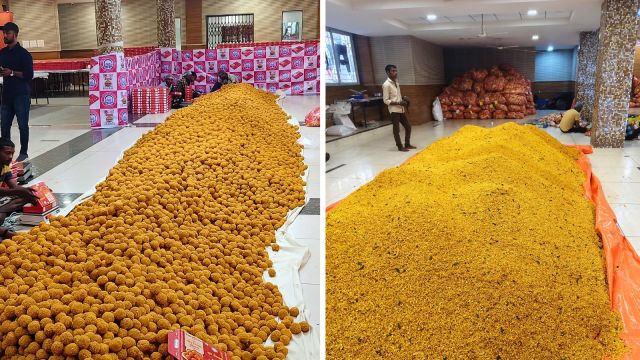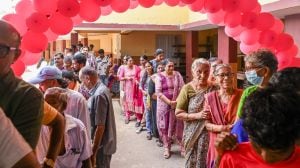Click here to join Express Pune WhatsApp channel and get a curated list of our stories
Ladu-Chivda sale, which has a place in the Guinness Book of Records, enters 38th year
In a scene straight out a foodie’s playbook, large platters of bright, crispy chivda are receiving a final mix, the aroma of roasted peanuts dances in the air, heaps of coconut pieces dry and acquire a rich colour, oil and ghee cans are stacked into high platforms, and laddoos shine like thousands of little suns. […]
 There are two lakh kg of laddoos and chivda each on sale this year.(Special Arrangement)
There are two lakh kg of laddoos and chivda each on sale this year.(Special Arrangement)In a scene straight out a foodie’s playbook, large platters of bright, crispy chivda are receiving a final mix, the aroma of roasted peanuts dances in the air, heaps of coconut pieces dry and acquire a rich colour, oil and ghee cans are stacked into high platforms, and laddoos shine like thousands of little suns. Pravin Chorbele of the Poona Merchants Chamber says that curry leaves alone fill a truck.
This is a ‘mangal karyalay’ in Marketyard where a Pune Diwali tradition has picked up steam before the festival of lights. Every year, the Poona Merchants Chamber offers a Ladu-Chivda sale, in which the festive delicacies are prepared and sold at less-than-market rates so that low-income homes can have a feast during Diwali. The 38th year of this tradition got underway on October 14 and will continue till the day before Diwali. The inauguration was by District Collector Jitendra Dudi and Police Commissioner Amitesh Kumar.
“Thirty-seven years ago, when the economy was bad and public mood low, then Chief Minister Vasantdada Patil summoned a few of us businessmen and told us, ‘Aap logon ke liye kuchh karo’. He gave us sugar and daal and that’s how we started. We made 50 kg laddoos and chivda that first year. We distributed these among those people who were in a very bad condition. Every year, irrespective of the state of the economy, we have made ladi-chidwa before Diwali,” says Chorbele.
 Ladoos at ‘mangal karyalay’ in Marketyard, where a Pune Diwali tradition has picked up steam before the festival of lights. (Special Arrangement). (Special Arrangement)
Ladoos at ‘mangal karyalay’ in Marketyard, where a Pune Diwali tradition has picked up steam before the festival of lights. (Special Arrangement). (Special Arrangement)
Each year, the quantity keeps increasing. The tradition has entered the Limca Book of Records and the Guinness Book of Records. The kitchen is at work 24 hours. There are two lakh kg of laddoos and chivda each on sale this year. These are supplied through 22 centres spread across Pune and Pimpri Chinchwad.
“The work started a month ago. Companies, from whom we buy supplies throughout the year, give us the ingredients, such as dal, oil, ghee and poha, at a discounted rate. These ingredients are of the highest quality. We employ around 1,500 skilled cooks and workers and, after ritual prayers, the preparation begins a week before Diwali,” says Chorbele.
He emphasises that hygiene and authenticity are given priority during the process. “We don’t buy powdered dal from the market for the laddoos. We get the dal and grind it ourselves. That way, we are sure that there are no impurities,” he adds.
 hygiene and authenticity are given priority during the process. (Special Arrangement)
hygiene and authenticity are given priority during the process. (Special Arrangement)
Last year, the price was Rs 180 per kg of laddoo and chivda each; this year the rates have risen by Rs 10 each. “The price of LPG has gone up and we need to pay the workers more. We have to remember that the cooks put in a lot of dedication and hard work. We want Diwali to be good for everybody,” says Chorbele.
The original intent of the sale might have been to boost the fallen morale of the public but, at present, people from all cross-sections look forward to the sale for the flavours it offers. Chorbele says the laddoos and chivda are being sent to the jawans at the border “and they look forward to it”. “There are parents who carry it for their children who are living in the US and the UK, among other foreign countries. Families, who have moved abroad, ask their relatives in Pune to send them the laddoo chivda. We deliver these orders in advance so that they can reach abroad before Diwali,” says Chorbele. Corporates buy in bulk to distribute the goodies to their staff. Packets travel to other cities, especially Delhi and Bengaluru.
Towards the end of the sale, the workers get tired rolling the laddoos but there are always a long queue outside the centres where people can buy the fare. “Many people say that they will roll the laddoos at home if we gave them the mix. The laddoos and chidwa have become an essential part of the celebration,” says Chorbele. The kitchen is humming with activity, the sale counters are bustling and, in homes across the city, Diwali celebrations have started with mouthfuls of laddoo and chivda.
Click here to join Express Pune WhatsApp channel and get a curated list of our stories








